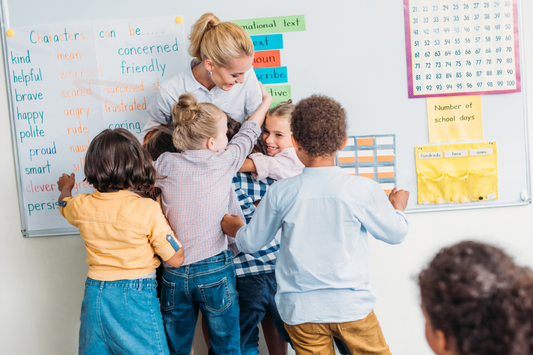Enrollment for Spring term is now closed. We hope to see you back for the Summer term, which opens on May 30, 2023!
Don’t Forget to Register With the NYC DOE ASPDP! Their Catalog Opens on May 30, 2023!
Do you think yoga and mindfulness can help the children you work with, but have no idea where to start? Learned some mindfulness activities, but can’t figure out when and how to use them? Run out of good options for working with your most challenging kids? Feeling burned out and needing skills to center and reconnect with your students?
Important Information
Educators and children alike deserve the chance to thrive, and a growing body of research shows that mindfulness is a powerful tool to help navigate a challenging world and build capacities in several of the areas most essential to teaching and learning: self-awareness and self-regulation, navigation of distraction, skillful relationship management, and more.
Join us for courses that explore how mindfulness can help educators build create better learning environments, develop a toolkit of skills for dealing with difficult situations, and bring the power of mindfulness to their students and themselves.
Learn to sooth the protective part of their brain and engage and exercise the thoughtful part, so learning can be maximized and distraction and disruption minimized.
You’ll walk away from each of these courses with a step-by-step approach for effectively integrating and sharing the proven practices of mindfulness in your school. Based on a program used with tens of thousands of children in NYC schools, this framework for helping educators and children access the inner resources of their body, breath and mind is comprehensive and effective, as well as accessible even for those with no prior mindfulness experience.
It’s time to move away from reactivity and towards balanced engagement with the world, both at home and at school. These engaging and joyful courses combine presentations, practices, discussion and reflection to send you back to your work inspired and empowered with both new tools and an clear understanding of how to implement them.
NYC DOE ASPDP Registration
3 P Credits/A+ Credits/45 CTLE Hours - Only $149 for each course
(does not include $125 ASPDP fee)
1 P Credit/A+ Credits/15 CTLE Hours - Only $99 for each course
(does not include $45 ASPDP fee)
Courses are pre-approved for salary differentials for NYC DOE Employees and/or
the 175 Required NYS PD Hours
|
Spring 2023
|
Dates
|
Summer 2023
|
Dates
|
|
Spring 2023 Term Registration Opens:
|
January 30, 2023
|
Summer 2023 Term Registration Opens:
|
May 30,
2023
|
|
Spring 2023 Term Registration Closes:
|
April 17, 2023
|
Summer 2023 Term Registration Closes:
|
July 31, 2023
|
|
Courses Begin:
|
February 6, 2023
|
Courses Begin:
|
June 12, 2023
|
|
Complete Courses by:
|
May 26, 2023
|
Complete Courses by:
|
September 1,
2023
|
How to Register and Enroll
To correctly enroll you must register and pay for each course on both the CE Credits Online website and the NYC DOE ASPDP website.
- Select the course(s) you wish to take from our website (up to 12 Credits per term).
- Add the course to your cart.
- When you are ready to check out, go to your cart, and click “Check Out”.
- You will be asked to log-in to your account or create a new account.
- Follow the enrollment and payment prompts. If you have a gift card or discount code, you will enter it at the end of the enrollment process.
- Upon purchase, you will receive an email receipt and be able to login to your eClassroom
-
Important: Course participants must be sure to register with ASPDP for each CE Credits Online course on the NYC DOE ASPDP website. Our courses are in the ASPDP course catalog using the Education Partner drop-down menu by selecting CE Credits Online. At that time, you will pay a registration fee to NYC DOE ASPDP. The fee is $125 for a 3-credit course or $45 for a 1-credit course.
- You may begin your course on the first day of the semester or upon enrollment (if the semester is already in progress).
-
Please Read the ASPDP FAQs for more information. Courses must be completed by the end of each semester to receive credit. You can contact us at support@cecreditsonline.org with any questions.
Upon Completion:
- At the end of the term, we will notify NYC DOE ASPDP of your completion status. They will verify your grades and payments before you receive credit. Your credits will be validated 4-6 weeks after the end of the semester, not upon your completion of the course.
- Once you have been “Validated for Credit” on the NYC DOE ASPDP site, you will be able to print your Credit Transcript. To view or print your transcript(s), go to “Show Enrolled Courses” on the ASPDP site and select the “View Print Transcripts” tab.


